Something is ailing New York hotels, but it might not be Airbnb
Hotel groups would love to blame Airbnb for the industry’s woes. So they probably aren’t too happy about a new study out from STR, a top hotel research firm, that finds Airbnb has had “no measurable effect” on hotels in Manhattan.


Hotel groups would love to blame Airbnb for the industry’s woes. So they probably aren’t too happy about a new study out from STR, a top hotel research firm, that finds Airbnb has had “no measurable effect” on hotels in Manhattan.
The STR report is based on actual Airbnb data—a contrast with previous assessments of the home-rental platform, which have generally relied on scraped information. It finds that Airbnb makes up about 10% of the hotel room supply in Manhattan, that Airbnb units are on average much cheaper than hotel units, and that most Airbnb guests stay for at least seven days.
“Overall, there was no obvious ‘smoking gun’ that hotels were being severely impacted by the growth of Airbnb unit sales in the Manhattan market,” the report states.
STR’s findings starkly oppose the views that hotel groups have attempted to spread. In October 2015, the Hotel Association of New York City released a report that accused Airbnb of costing the industry 4.6% of revenue from September 2014 to August 2015, or $451 million. Last month, a report from industry trade group American Hotel and Lodging Association accused Airbnb of an ”explosion of multi-unit operators.” The three percent of hosts renting “full-time” on Airbnb’s platform, ALHA claimed, were bringing in a disproportionate 24% of revenue.
Airbnb dismissed the ALHA report as “a specious study intended to mislead and manipulate.” But at the same time, STR’s report might also be a bit confusing. To wit, “no measurable effect,” the study’s prominent subheading, doesn’t mean that Airbnb has had no effect on New York hotels.
“The biggest conclusion from our study and analysis is not that there’s no influence at all, but no way to infer what that impact really is,” Ali Hoyt, an STR analyst tells Quartz. “We’re not suggesting that there isn’t any overlap between hotels and Airbnb. It’s likely that travelers could be looking at both when making their booking decisions.”
The one thing that is clear is that New York hotels are struggling. While the US hotel business improved broadly in 2015, New York was an unfortunate outlier. Among the top 25 markets, New York was one of two where hotels made less money per available room in 2015 than in 2014. It was the only top 25 market in which the average daily rate for a room fell. Year-on-year, the rate of growth in those metrics and one other—occupancy—has also been slowing for New York hotels over the last several years.
In other words, there might be no clear evidence that Airbnb is hurting New York hotels. But there’s also no clear evidence that Airbnb isn’t a factor.